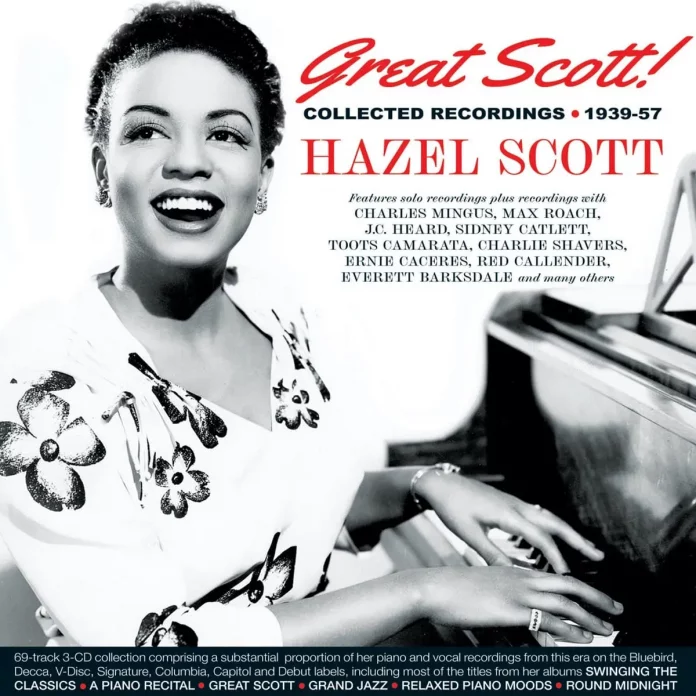Pictures of black American pianist and singer Hazel Scott show a confident and glamorous icon of success, which must have been a jolt to those who thought people like her should know their place despite unqualified talent. The opprobrium that followed her temerity in standing up to the House Un-American Activities Committee in the 1950s – she explained the difference between socialism and communism to its “little men” – did for her career.
Not only a child prodigy, Scott, as an adult performer with striking good looks, was also sought by the movie business and was probably the first black woman to host her own TV show. Outward commercial triumph was always threatened by her beliefs: she refused to perform before audiences segregated on grounds of colour, and she fought the movie industry’s tendency to cast black actors in scenes filmed alone so that they could be cut.
Karen Chilton’s biography of 2009 led the revival. At the 2019 Grammy awards ceremony, a year before Scott’s centenary and in front of what must have been a largely benighted audience, singer Alicia Keys cited Scott as a major influence and reprised the scene from the 1943 film The Heat’s On in which Scott plays two pianos at once. Keyboard cleverness and command elsewhere outshone her singing.
Scott was known for “swinging the classics”, which style gave the title to the 1940 album on which she’s accompanied by a sometimes frantic J.C. Heard at the drums. Whether the classics benefit from being swung is debatable. Rachmaninov’s Prelude In C Sharp Minor starts hopping, de profundis, after that sombre opening and offers a further reminder: that virtuosity – she auditioned for the Juilliard aged eight – sometimes charges everywhere without let or hindrance.
Scott’s musicianship and personality created an aura that made her seem invincible, even obstinate. This generous collection establishes the priority of the music, which was informed early on with jazz feeling and family connections with Fats Waller, Lester Young and Art Tatum. In 1939, Scott wrote arrangements for Coleman Hawkins. In 1955, she recorded Relaxed Piano Moods with Charles Mingus and Max Roach, where the chordal Lament breaks into scintillating runs and A Foggy Day is uptempo and mischievously syncopated. Elsewhere, the influence of Earl Hines and Mary Lou Williams is never far away.
The 69 tracks culled from seven albums on this three-CD set also include “straight” Scott from the 1946 disc A Piano Recital, on which Chopin is played with variable degrees of accuracy and depth of understanding. It’s another example of a pianist confident of being able to do anything. Yet the Tatumesque tour de force of Body And Soul from 1943 is a solo performance with spoken introduction, and a chuckle as the tune segues into stride mode. It’s one of the best examples of how a musician with seemingly limitless gifts employs them only up to the time when florid brilliance can degenerate into mere show. Being aware of that tipping point was also a Scott gift.
Discography
CD1: (1) Calling All Bars; Mighty Like The Blues; You Gave Me The Go-By; Why Didn’t William Tell?; [Swinging The Classics] (2) Ritual Fire Dance; Two-Part Invention In A Minor; Country Gardens; Prelude In C Sharp Minor; Valse In D Flat Major; Hungarian Rhapsody No 2; (3) Hazel’s Boogie Woogie; Blues In B Flat; Embraceable You; Three Little Words; Dark Eyes (Otchitchornyia); Hallelujah; (4) People Will Say We’re In Love; Honeysuckle Rose; Body And Soul; C Jam Blues; Take Me In Your Arms; (5) I’m Glad There Is You; Fascinating Rhythm; The Man I Love (72.00)
CD2: [A Piano Recital] (6) I Guess I’ll Have To Change My Plans; Valse In C Sharp Minor; Fantasie Impromptu; Nocturne In B Flat Minor; A Rainy Night In G; How High The Moon; Sonate In C Minor – Toccata; (7) On The Sunny Side Of The Street; I’ve Got The World On A String; Butterfly Kick; Ich Vill Sich Spielen; [Great Scott] (8) Soon; Love Me Or Leave Me; Emaline; Love Will Find A Way; Mary Lou; Dancing On The Ceiling (He Dances On My Ceiling); Nightmare Blues; Brown Bee Boogie; [The Late Show] (9) That Old Black Magic; [Grand Jazz] (10) For All We Know; Tinkerbell Blows Again; Soothe Me; Un Gamin De Paris; Whatever Happened To Captain Hook? (60.18)
CD3: J’Aime Bien Paris; [Relaxed Piano Moods] (11) Like Someone In Love; Peace Of Mind; Lament; The Jeep Is Jumpin’; Git Up From There; A Foggy Day; Mountain Greenery; [‘Round Midnight] (12) In The Wee Small Hours Of The Morning; It’s You Or No-one; It’s Easy To Remember; (13) Just Imagine; Lucky To Be Me; ’Round Midnight; I Wish I Didn’t Love You So; For You, For Me, For Evermore; Ev’ry Time; Maybe; Love Is The Thing; Warm All Over (73.29)
(1) Scott (p, v); Sextet of the Rhythm Club of London – Danny Polo (cl); Pete Brown (as); Albert Harris (g); Peter Barry (b, v); Arthur Herbert (d). New York, 1 December 1939.
(2) Scott (p); J.C.Heard (d). New York, 11 December 1940.
(3) Scott (p). New York, 27 February 1942.
(4) Scott (p, v); Toots Camarata Orchestra. New York, 22 March 1945.
(5) as (4). New York, 3 May 1945.
(6) as (3). New York, 1946.
(7) as (4). New York, 1947.
(8) Scott (p, v). Unknown g, b, and d. New York, October 1947.
(9) Scott (p); Red Callender (b); Lee Young (d). Los Angeles, 1952.
(10) Scott (p,v); Buddy Banks (b); Gerard Pochonet (d). Paris, 28 September 1953.
(11) Scott (p); Charles Mingus (b); Max Roach (d). New Jersey, 21 January 1955.
(12) Scott (p); Everett Barksdale (g); Sandy Block (b); Jimmy Crawford (d). New York, 27 December 1956.
(13) as (12). New York, 11 January 1957.
Acrobat Music ACTRCD9130
















